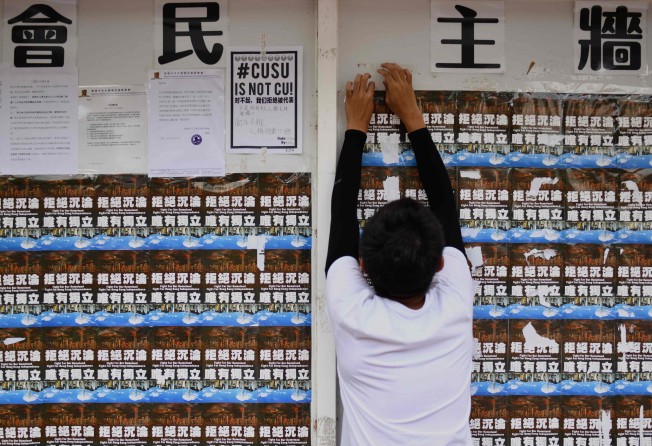Letters to the Editor, September 29, 2017

Clarification on independence calls needed
Universities in Hong Kong should stop issuing confusing statements, and lay down clear guidelines instead.
The easiest way to do this would be to follow the policies adopted by universities in the United States.
The University of Chicago a few years ago published a “Statement on Principles of Free Expression” that protects the freedom of expression, with exceptions. It says the university has the right to “restrict expression, for example, that violates the law, is threatening, harassing, or defamatory, or invades substantial privacy or confidentiality interests”.
This kind of statement by tertiary institutions here would address the issue of students expressing support for Hong Kong independence. Because the benchmark of whether the right should be protected or not would be based on whether such an expression of support violated the laws of Hong Kong.
Article 39 of the Basic Law states that the “rights and freedoms enjoyed by Hong Kong residents shall not be restricted unless as prescribed by law”.
I do not believe there is a law restricting speech in support of independence. This means that expression of support for independence is not only not violating the law but, in fact, is protected by the words “shall not be restricted”.
Navis I. Kim, Fo Tan
Easy fixes for Tai Tam traffic black spots
The report on traffic at Tai Tam (“Solution proposed for Tai Tam bottleneck”, September 24) was welcome news for southside residents of Hong Kong Island. Bottlenecks, a regular occurrence on the narrow road [crossing Tai Tam Reservoir], usually happen when two large vehicles enter from opposite sides at the same time, or when drivers lack the confidence to manoeuvre and pass a wide vehicle.
As proposed solutions wind their way through the community, and environmental impact, legislative and funding processes, and wait for final approval, one of two simple and also cost-effective solutions could alleviate hours of aggravation for thousands of residents:
● A height limit system for heavy vehicles that would trip and stop opposing traffic until the vehicle has crossed the bridge; or,
● A fixed-cycle traffic light, forcing cars to queue and transit the bridge at alternate times.
There is no reason to wait for 10 years for a new bridge.
Southern District administration officials can address this issue now.
Jennifer Schlueter, Tai Tam
Let teachers ignore parents’ text messages
Earlier this year, a survey revealed that teachers in primary and secondary schools receive a lot of instant messages after school hours, from both parents and students.
With advances in technology, it is obviously easier now for parents and students to do this, as most now own smartphones. But this is wrong, as the teachers are at home and they should be allowed to relax in their free time. They might also have to prepare for the next day’s lessons, and so these messages are disruptive.
Schools have to issue guidelines and allow teachers to decline to answer these messages while they are at home. This should serve as a reminder that we need to use these electronic devices responsibly.
Cecilia Cheng, Kwai Chung
Cut back on school hours to boost learning
It is difficult for children to stay focused in the classroom for extended periods. A six-hour day is long enough for most pupils, from 9am to 3pm. They will be more productive during a shorter school day, because they get enough time to rest.
If they come to the classroom refreshed and facing a shorter working day, they will be more likely to absorb knowledge. Youngsters who are tired will be less efficient.
Their brains cannot handle having to deal with five or six subjects a day. With fewer lessons there is less stress, which creates a more enjoyable learning environment.
Talent can be nurtured if students have more time to rest and to study at home after the school day. They can learn about the benefits of good time management.
If they are better organised and under less pressure, they can learn how to become more independent and are likely to get better academic results.
Many primary and secondary pupils get less than one hour of free time a day, because of numerous school assignments and extracurricular activities.
Having more free time can help them relieve the stress they feel on a daily basis.
It is also important that they not spend all their free time on smartphones and computers, but get outside and exercise.
Children, like adults, need the right work-life balance, and a shorter school day will help.
Christy Lam, Tseung Kwan O
AI can be force for good, but mind the risks
With such rapid technological advances, there is a lot of talk about what the future holds for artificial intelligence (AI) and how it will affect our lives.
Although AI will bring a lot of benefits, we have to be aware of potential disadvantages. It can transform our homes with smart appliances and give us driverless cars, as well as improve the quality of health care provided if it is utilised properly.
As AI becomes ever more advanced, it could even replace human employees in some workplaces and the unemployment rate could rise.
I would also be concerned about a society in the future that was overdependent on AI.
As governments and companies work on research and development for AI, they must always act responsibly and make sure that AI helps rather than hinders humans.
Kennice Tse Kit-yee, Kwai Chung